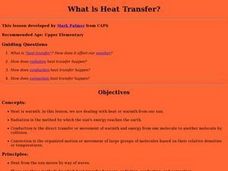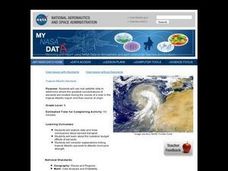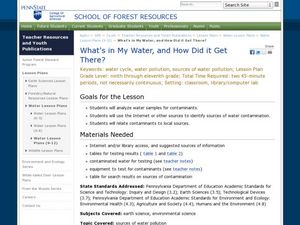Curated OER
What's the Frequency, Roy G. Biv?
Introduce starting space scientists to the electromagnetic spectrum, expecially the portion of visible light. Teach them about wavelength and frequesncy. Then give them a roll of adding machine tape and a manila folder to make a...
Curated OER
Solar Kit Lesson #8 - Positioning Solar Panels II: Explorations with Stationary Panels
This lesson is preparation-intensive, but well worth the investment. You will construct five or six portable testing stations with which lab groups will gather data on the best position for collecting sunlight with a solar panel. This is...
Huntington Library
Light in Painting
How do painters use and manipulate light in their artwork to give emphasis and establish mood and emotion? Pupils will analyze a few examples of landscape and portrait painting in order to explore the how light is used in art,...
Curated OER
Atmospheric Chemistry
If you need a comprehensive review of the development of Earth's atmosphere through the ages, then this is for you! The presentation starts with a introduction to theories of planet formation and initial distribution of isotopes in the...
K12 Reader
Atmospheric Layers
In this two-part reading comprehension worksheet, kids read a passage about the atmospheric layers surrounding the earth and then respond to a series of comprehension questions based on the passage.
Texas State Energy Conservation Office
Investigation: Building a Parabolic-Trough Collector
Amateurs of alternative energy build a mini parabolic-trough solar energy collector and use it to heat water. Temperature is recorded over a three-minute period and the data is graphed and analyzed. Note that in order to paint aquarium...
Wild BC
Greenhouse Gas Line-Up
Discuss different sources of energy and how much greenhouse gas each might emit. The six sources are then ranked according to emissions from greatest to least. Finally, the true cumulative emissions are revealed to show the class how...
Messenger Education
Give Me a Boost—How Gravity Assists Aid Space Exploration
The propellant needed for space explorations runs in the thousands, while paying to get the craft into orbit costs millions! In the second installment of three, two activities explore laws of conservation of energy and momentum. Using...
Science Matters
Energy Transfer and Transformation
When you take a simple task and create an exceptionally difficult way to complete it, it is known as a Rube Goldberg machine. These machines are filled with many types of energy transfers and energy transformations. Here, pupils...
Savvas Learning
Let's Get Moving
Scholars examine, cut, paste, and sort 12 images featuring different types of movement in order to show what they know about energy—potential and kinetic.
Cornell University
Light Waves: Grades 6-8
Explore the behavior of light with different materials. Collaborative groups determine whether certain materials absorb, reflect, diffract, or transmit light waves. They then measure the angle of incidence and angle of reflection.
Curated OER
Troical Atlantic Aerosols
Students explore the effect aerosols have upon he weather and climate. They observe NASA satellite images to explore and draw conclusions about aerosol transport. From studying the images, students track the path of aerosols. They...
Curated OER
Energy and the Environment: What Can We Do?
Learners consider the impacts of global warming and brainstorm ways to help decrease their contribution to the problem. In this climate change lesson, students are exposed to facts concerning global warming and think of ways to...
Curated OER
Tropical Atlantic Aerosols
Students analyze NASA data from the Multi-angle Imaging Spectroradiometer. In this NASA data lesson plan, students access an assigned website to examine information from the MISR on the Terra Satellite. They determine how desert dust...
Curated OER
Images of Our Changing Earth
Students identify and explain that remote sensing can detect changes on the Earth's surface that occur over time, and name at least three: urbanization, deforestation, and succession. They select a global change issue to investigate and...
Curated OER
What's in My Water, and How Did it Get There?
Students analyze water samples to see the contaminants and then use the Internet to find the sources of the contamination. In this investigative water lesson students analyze water and work together to solve the mystery of...
Curated OER
A Comparison of Land and Water Temperature
Students examine NASA satellite observations of surface temperature and investigate the seasonal changes of land and water temperature.
Curated OER
Aerosol Lesson: Science - Graphing SAGE II Data
Students examine and plot atmospheric data on bar graphs.
Curated OER
Earth's Poles
In this Earth's Poles activity, learners survey, examine and dissect the North and South Magnetic Poles, the Earth's axis and summarize the Aurora legends. Students research six directives involving space weather and predicting answers.
Curated OER
Magnetic Turtles
Students encounter how magnetic forces affect the navigation ability of sea turtle hatchings. Research is done to find out where the true magnetic North Pole lies. Exploration is discussed on how many things here on earth are affected by...
Curated OER
HABITAT for the other 90%
Learners examine the connection between the habitat needs of endemic species to the habitat needs of humans. In this habitat instructional activity young scholars research the habitat requirements of a given family then develop an...
Curated OER
How Does the Loss of Ozone Affect Our Climate
Students explore the greenhouse effect and what it does to the environment. They discuss if and how human behavior contributes to global warming and test natural materials for carbon content.
Curated OER
Simple Organic Compounds
In this organic compounds worksheet, students read about the development of chlorofluorocarbons and the breakdown of this compound in the atmosphere. Students complete 2 short answer questions.

























